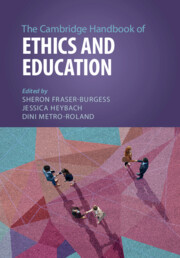Book contents
- The Cambridge Handbook of Ethics and Education
- The Cambridge Handbook of Ethics and Education
- Copyright page
- Epigraph
- Contents
- Figures
- Tables
- Contributors
- Foreword
- Preface
- Acknowledgments
- Part I Traditions in Ethics and Education
- Part II Ethics and Education in Practice
- Part III Emerging Ethical Pathways and Frameworks
- 28 Defining Moral Responsibility for School Leaders in Times of Democratic Crisis
- 29 Convivialism, Interdependence, and Education
- 30 New Existentialism
- 31 Antiracist Moral and Civic Education
- 32 A Decolonial Feminist Perspective
- 33 Ethics and Mindful Leadership in Education
- 34 Ethics as a Field Discipline in the Classroom
- 35 Centering an Environmental Ethic in Climate Crisis
- 36 Ethical Inquiry in Educational Research
- 37 Education and the Technological Horizon
- 38 Teaching in Credal Deep Pluralism
- 39 A Pragmatic Approach to Ethics in Education
- 40 Spectatorship, Black Bodies, and Urban Education
- Index
- References
34 - Ethics as a Field Discipline in the Classroom
An Homage to Greta Thunberg
from Part III - Emerging Ethical Pathways and Frameworks
Published online by Cambridge University Press: 07 March 2024
- The Cambridge Handbook of Ethics and Education
- The Cambridge Handbook of Ethics and Education
- Copyright page
- Epigraph
- Contents
- Figures
- Tables
- Contributors
- Foreword
- Preface
- Acknowledgments
- Part I Traditions in Ethics and Education
- Part II Ethics and Education in Practice
- Part III Emerging Ethical Pathways and Frameworks
- 28 Defining Moral Responsibility for School Leaders in Times of Democratic Crisis
- 29 Convivialism, Interdependence, and Education
- 30 New Existentialism
- 31 Antiracist Moral and Civic Education
- 32 A Decolonial Feminist Perspective
- 33 Ethics and Mindful Leadership in Education
- 34 Ethics as a Field Discipline in the Classroom
- 35 Centering an Environmental Ethic in Climate Crisis
- 36 Ethical Inquiry in Educational Research
- 37 Education and the Technological Horizon
- 38 Teaching in Credal Deep Pluralism
- 39 A Pragmatic Approach to Ethics in Education
- 40 Spectatorship, Black Bodies, and Urban Education
- Index
- References
Summary
This chapter is inspired by Greta Thunberg’s challenge to global education that does not have the power to challenge twenty-first-century existential crises. Its curriculum proposals emerge from Evelyn Briggle’s, Robert Frodeman’s, and Adam Brister’s research on what they call field philosophy. The model joins philosophers with researchers in other fields to create solutions to environmental problems that require what Nietzsche calls a “mountain-top” vision. The chapter applies field philosophy’s methodology to address a fundamental philosophical question: How do we ensure life’s future and the planet’s health? Education grounded in field philosophy will promote the creation of knowledge rather than its assimilation at all levels of education. And that creation will be a collaboration between student and teacher.
- Type
- Chapter
- Information
- The Cambridge Handbook of Ethics and Education , pp. 712 - 733Publisher: Cambridge University PressPrint publication year: 2024

